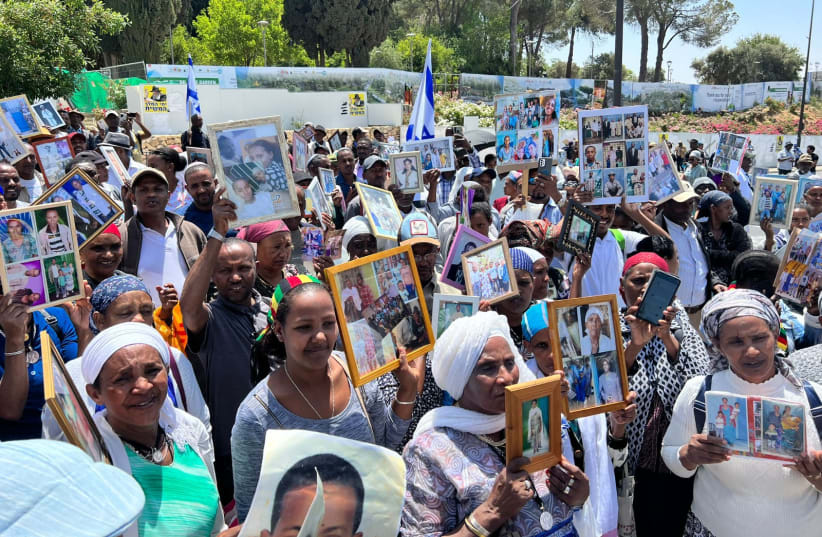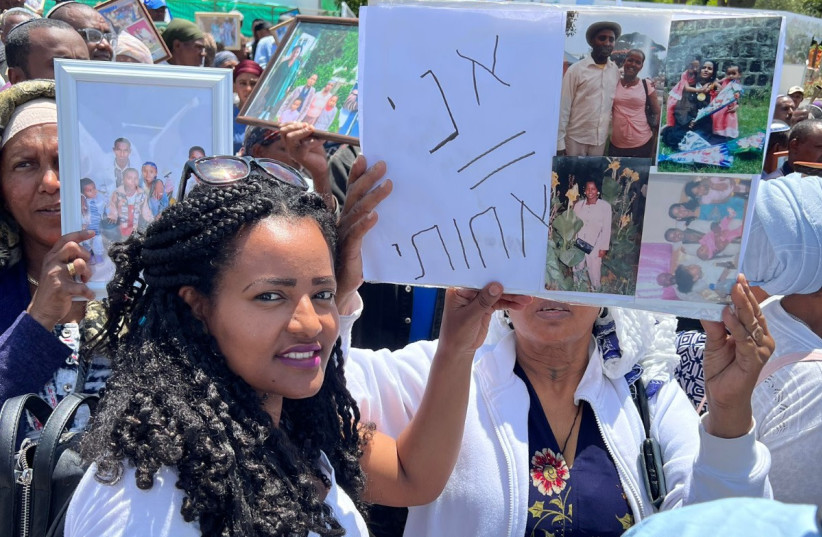Hundreds of Ethiopian olim protested Sunday outside of the weekly cabinet meeting in Jerusalem, demanding support for continued immigration from Ethiopia.
The protest also focused on the fact that the current budget, which is set to be voted on during the next few weeks, “does not include a budget for aliyah from Ethiopia.”
The issue of aliyah from Ethiopia is complex. Many special operations have been carried out since the 1980s to assist the Beta Israel community to immigrate. Their success has led the government and the Jewish Agency to announce numerous times that the official aliyah from Ethiopia has ended – but it has since been renewed many times.
In 2015, the government committed to the continued immigration of Ethiopians who have a first-degree relative in Israel, when in practice the implementation of the decision was partial. Many previous governments have drawn out the time when it came to implementation.
Israel promised aliyah of Ethiopians with relatives in Israel
In 2021, 1,636 immigrants from Ethiopia came to Israel as part of Operation Zur Israel, which renewed the immigration after a years-long hiatus. This was led by former aliyah and integration minister Pnina Tamano-Shata (National Unity), who is herself a member of the Ethiopian Jewish community in Israel.
Surafel Alamo, the coordinator of the Struggle to Save Ethiopian Jewry, said “we are not second-class citizens. While I fought for Israel in a variety of operations [as a soldier], I had to fight for many years until my sisters were allowed to immigrate to Israel. We do not deserve this, and I will do everything so that the suffering I went through will not be the share of my friends.”
Alamo added that “we will not be silent about inequality and injustice and we will continue with more demonstrations until the Israeli government chooses to do the right Zionist, Jewish and moral thing.”
Former MK Avraham Neguise (Likud), who has been one of the leaders of the movement calling for extended aliyah from Ethiopia, added that “although the decision aimed at speeding up the aliyah was made back in 2015 by Prime Minister Benjamin Netanyahu, the suffering of the families in Israel continues. The Jewish community in Ethiopia is in a bad nutritional state and lives in harsh conditions. We will fight in order to dry the tears of the suffering families in Israel and their brothers and sisters in Addis Ababa and Gondar.”
Gebra Warko, chairwoman of the Shaar Yishuv organization for aliyah and integration of Ethiopian Jews, added that “on the one hand, the government is working above and beyond in order to promote mass immigration from Eastern Europe. On the other hand, it ignores thousands of citizens who suffer for many decades from being separated from their brothers, sisters and parents who are waiting in the Jewish community in Ethiopia while their lives are in danger. The demonstration this morning is just the beginning.”
According to government statistics, at the end of 2021 the population of Ethiopian-origin citizens numbered 164.4 thousand residents – 90.6 thousand born in Ethiopia and 73.8 thousand born in Israel.
In 1984, about 7,000 Ethiopian Jews arrived in Israel as part of a secret effort known as Operation Moses. Later on, Israeli security services embarked on even more daring operations, code-named Operation Solomon (1991), which rescued a further 20,000 Jews.

